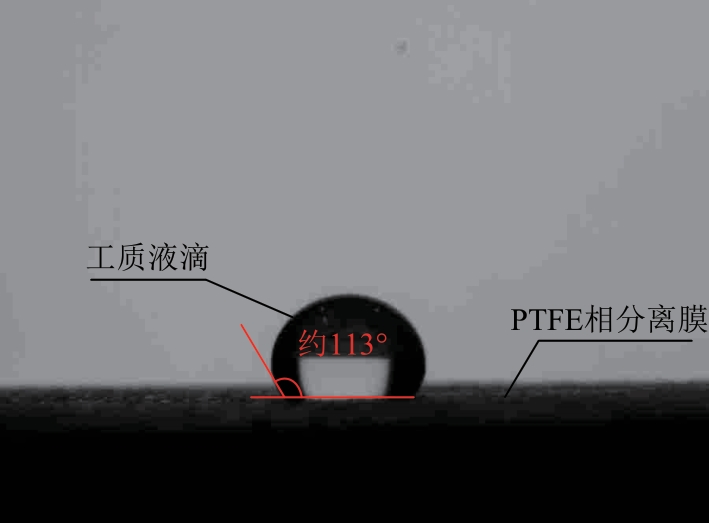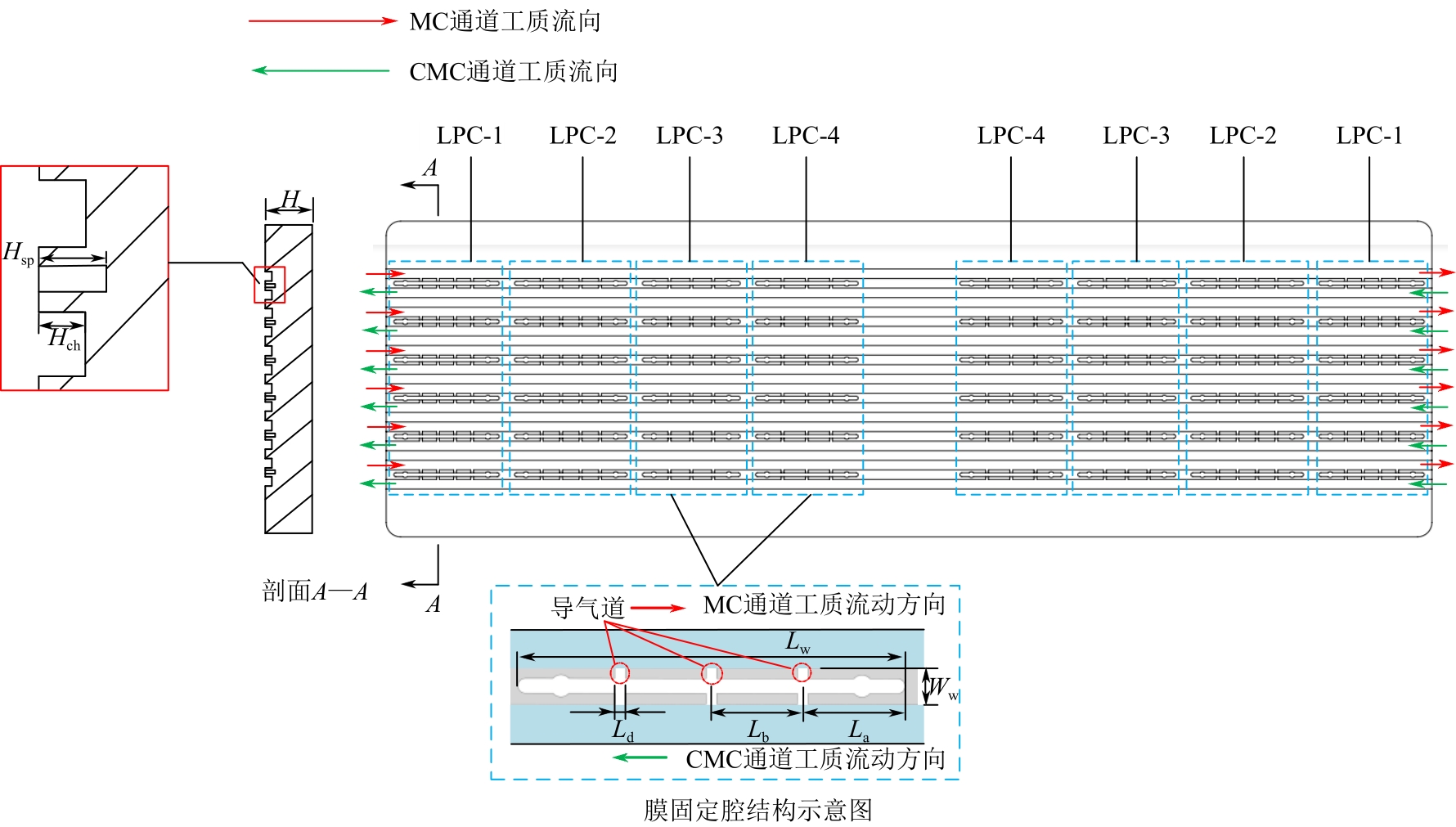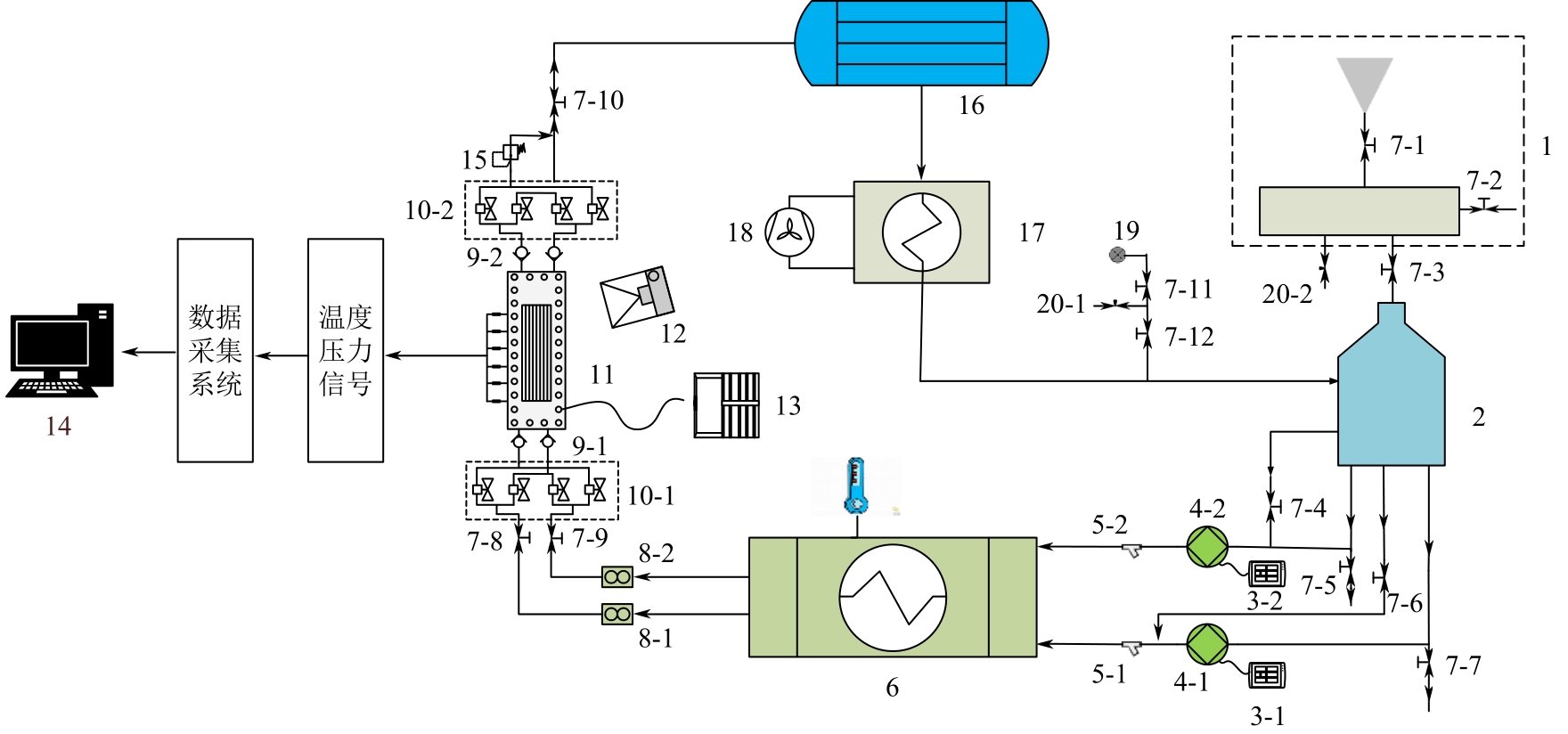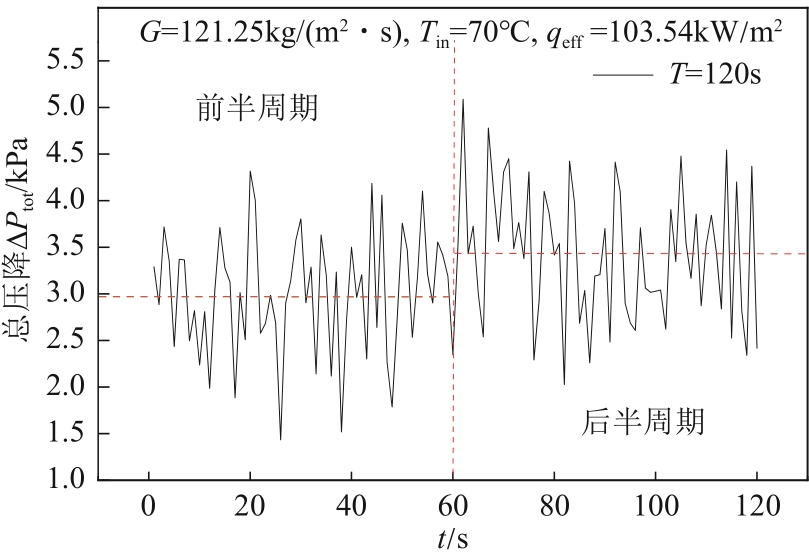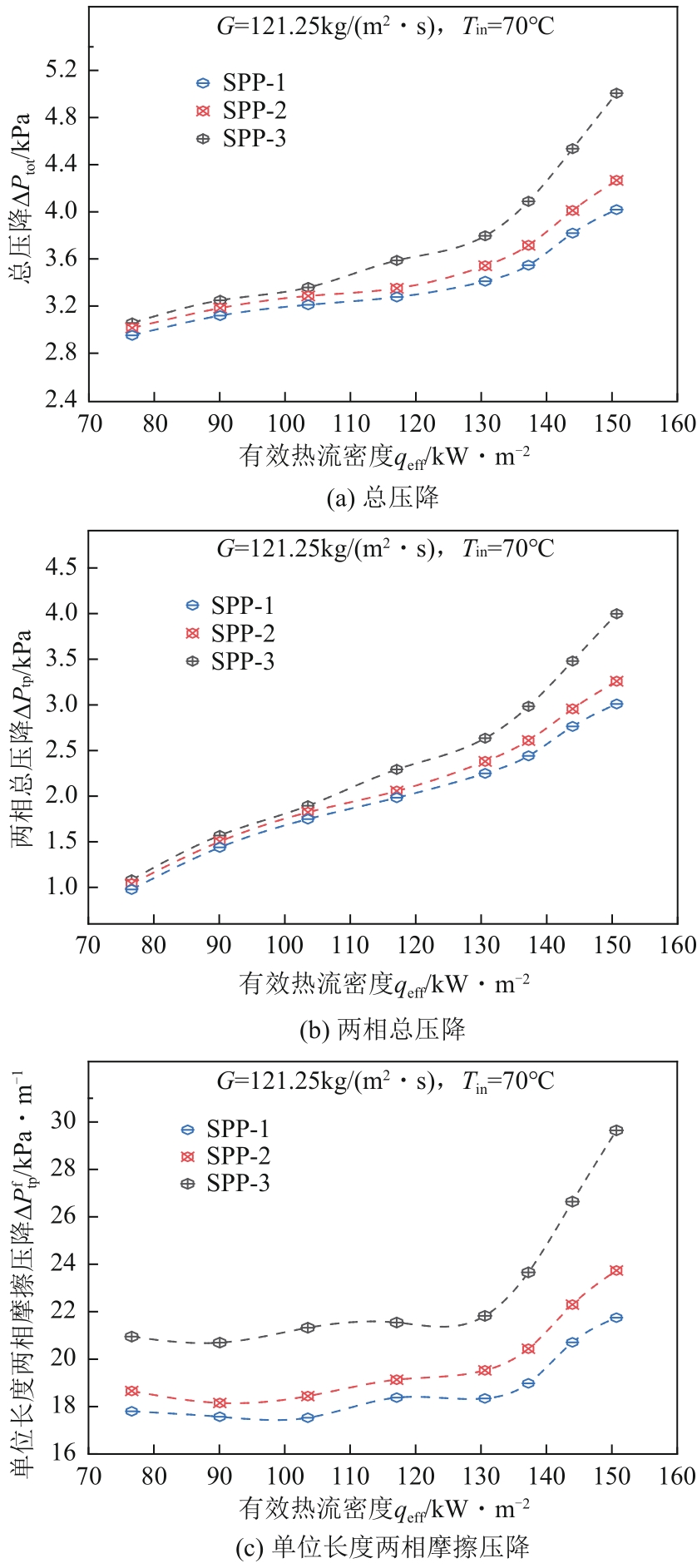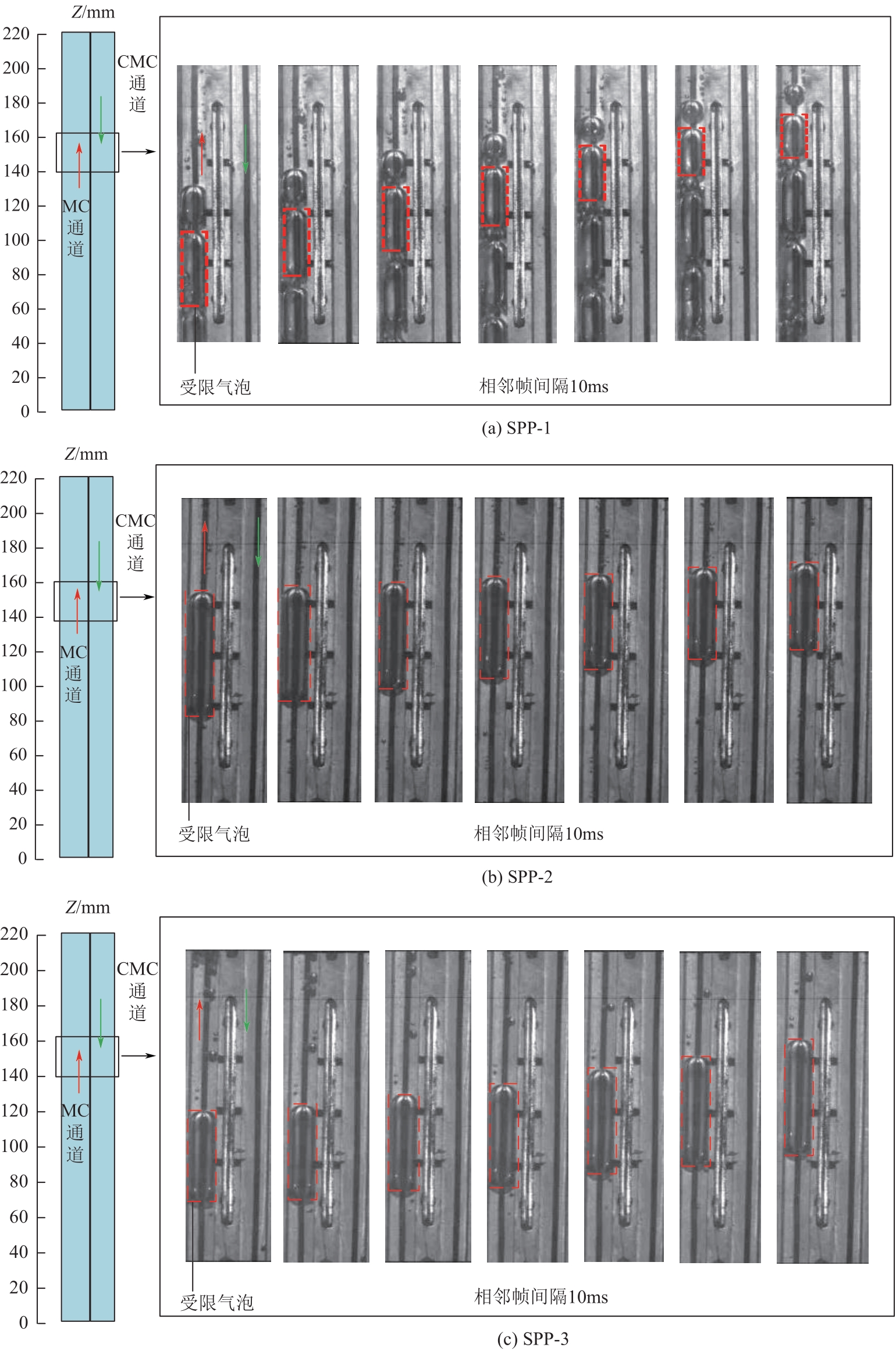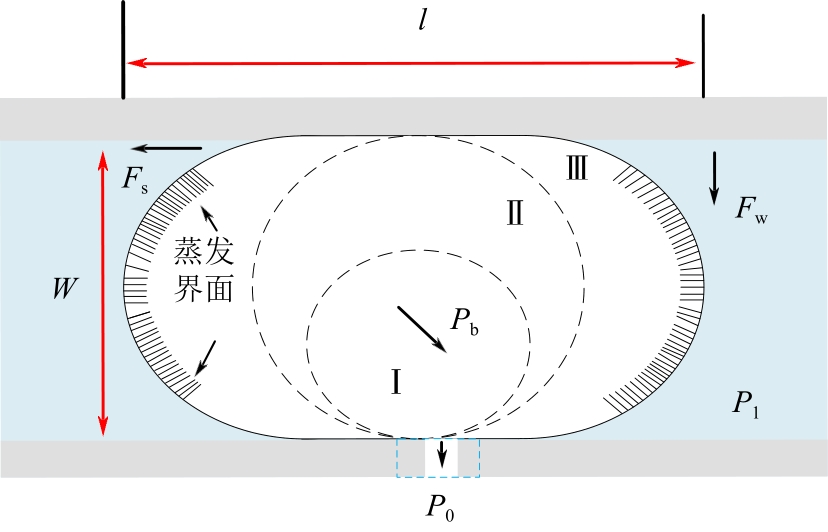Chemical Industry and Engineering Progress ›› 2023, Vol. 42 ›› Issue (12): 6157-6170.DOI: 10.16085/j.issn.1000-6613.2023-0045
• Chemical processes and equipment • Previous Articles
Analysis and visualization of flow boiling pressure drop in microchannels with phase separation structure
LUO Xiaoping( ), ZHOU Jiayu, LI Guizhong
), ZHOU Jiayu, LI Guizhong
- School of Mechanical and Automotive Engineering, South China University of Technology, Guangzhou 510641, Guangdong, China
-
Received:2023-01-10Revised:2023-05-05Online:2024-01-08Published:2023-12-25 -
Contact:LUO Xiaoping
相分离结构微细通道流动沸腾压降分析与可视化
- 华南理工大学机械与汽车工程学院,广东 广州 510641
-
通讯作者:罗小平 -
作者简介:罗小平(1967—),教授,博士生导师,主要研究方向为微通道换热器相变传热、EHD强化沸腾传热及其控制。E-mail:mmxpluo@scut.edu.cn。 -
基金资助:国家自然科学基金(22178118);广东省自然科学基金(2019A1515011053)
CLC Number:
Cite this article
LUO Xiaoping, ZHOU Jiayu, LI Guizhong. Analysis and visualization of flow boiling pressure drop in microchannels with phase separation structure[J]. Chemical Industry and Engineering Progress, 2023, 42(12): 6157-6170.
罗小平, 周家玉, 李桂中. 相分离结构微细通道流动沸腾压降分析与可视化[J]. 化工进展, 2023, 42(12): 6157-6170.
share this article
Add to citation manager EndNote|Ris|BibTeX
URL: https://hgjz.cip.com.cn/EN/10.16085/j.issn.1000-6613.2023-0045
| 物性 | 数值 |
|---|---|
| 气相密度/kg·m-3 | 0.60 |
| 液相密度/kg·m-3 | 1027 |
| 饱和温度/℃ | 102.4 |
| 表面张力/mN·m-1 | 59.92 |
| 液相比热容/J·kg-1·K-1 | 3640 |
| 气化潜热/J·kg-1 | 2304 |
| 液相黏度/Pa·s | 0.00053 |
| 物性 | 数值 |
|---|---|
| 气相密度/kg·m-3 | 0.60 |
| 液相密度/kg·m-3 | 1027 |
| 饱和温度/℃ | 102.4 |
| 表面张力/mN·m-1 | 59.92 |
| 液相比热容/J·kg-1·K-1 | 3640 |
| 气化潜热/J·kg-1 | 2304 |
| 液相黏度/Pa·s | 0.00053 |
| 长度L/mm | 宽度W/mm | 高H/mm | 单条通道宽度Wch/mm | 单条通道高度Hch/mm | 肋厚Ww/mm | 平行通道数量N/条 |
|---|---|---|---|---|---|---|
| 220 | 66 | 10 | 2 | 2 | 2 | 12 |
| 长度L/mm | 宽度W/mm | 高H/mm | 单条通道宽度Wch/mm | 单条通道高度Hch/mm | 肋厚Ww/mm | 平行通道数量N/条 |
|---|---|---|---|---|---|---|
| 220 | 66 | 10 | 2 | 2 | 2 | 12 |
| 型号 | La/mm | Lb/mm | Ld/mm | Lw/mm | Ll/mm | Hsp/mm | Nps(导气道条数)/条 |
|---|---|---|---|---|---|---|---|
| LPC-1 | 5.7 | 3.6 | 0.6 | 22.2 | 216.4 | 3 | 4 |
| LPC-2 | 5.7 | 4.1 | 0.6 | 23.7 | 165.2 | 3 | 4 |
| LPC-3 | 5.7 | 4.6 | 0.6 | 20.6 | 111.4 | 3 | 3 |
| LPC-4 | 5.7 | 5.1 | 0.6 | 21.6 | 64.6 | 3 | 3 |
| 型号 | La/mm | Lb/mm | Ld/mm | Lw/mm | Ll/mm | Hsp/mm | Nps(导气道条数)/条 |
|---|---|---|---|---|---|---|---|
| LPC-1 | 5.7 | 3.6 | 0.6 | 22.2 | 216.4 | 3 | 4 |
| LPC-2 | 5.7 | 4.1 | 0.6 | 23.7 | 165.2 | 3 | 4 |
| LPC-3 | 5.7 | 4.6 | 0.6 | 20.6 | 111.4 | 3 | 3 |
| LPC-4 | 5.7 | 5.1 | 0.6 | 21.6 | 64.6 | 3 | 3 |
| 型号 | N1/个 | N2/个 | N3/个 | N4/个 | Ntot/个 | 固定孔尺寸 /mm | 排气孔尺寸 /mm |
|---|---|---|---|---|---|---|---|
| SPP-1 | 8 | 8 | 6 | 6 | 336 | 1.2 | 0.6 |
| SPP-2 | 4 | 4 | 2 | 2 | 144 | 1.2 | 0.6 |
| SPP-3 | 0 | 0 | 0 | 0 | 0 | 1.2 | 0.6 |
| 型号 | N1/个 | N2/个 | N3/个 | N4/个 | Ntot/个 | 固定孔尺寸 /mm | 排气孔尺寸 /mm |
|---|---|---|---|---|---|---|---|
| SPP-1 | 8 | 8 | 6 | 6 | 336 | 1.2 | 0.6 |
| SPP-2 | 4 | 4 | 2 | 2 | 144 | 1.2 | 0.6 |
| SPP-3 | 0 | 0 | 0 | 0 | 0 | 1.2 | 0.6 |
| 测量参数 | 测量仪器 | 型号 | 量程 | 精度 |
|---|---|---|---|---|
| 压力 | 压力传感器 | HY-131 | 0~100kPa | 0.2% |
| 压差 | 压差传感器 | HY-3351 | 0~10kPa | 0.2% |
| 温度 | 热电偶 | PT-100 | 0~1200℃ | 0.1℃ |
| 流量 | 转子流量计 | LZB-WS-10 | 6~60L/h | 2.5% |
| 测量参数 | 测量仪器 | 型号 | 量程 | 精度 |
|---|---|---|---|---|
| 压力 | 压力传感器 | HY-131 | 0~100kPa | 0.2% |
| 压差 | 压差传感器 | HY-3351 | 0~10kPa | 0.2% |
| 温度 | 热电偶 | PT-100 | 0~1200℃ | 0.1℃ |
| 流量 | 转子流量计 | LZB-WS-10 | 6~60L/h | 2.5% |
| 测量参数 | 最大不确定度/% | 测量参数 | 最大不确定度/% |
|---|---|---|---|
| G | 2.50 | ∆Psp,f | 3.72 |
| qeff | 3.31 | ∆Ptp,grav | 3.21 |
| Lsp | 2.76 | ∆Ptp,a | 3.41 |
| xe,out | 7.31 | ∆Ptp,f | 6.59 |
| ∆Psp,grav | 2.76 |
| 测量参数 | 最大不确定度/% | 测量参数 | 最大不确定度/% |
|---|---|---|---|
| G | 2.50 | ∆Psp,f | 3.72 |
| qeff | 3.31 | ∆Ptp,grav | 3.21 |
| Lsp | 2.76 | ∆Ptp,a | 3.41 |
| xe,out | 7.31 | ∆Ptp,f | 6.59 |
| ∆Psp,grav | 2.76 |
| 1 | Yuanzheng LYU, XIA Guodong, CHENG Lixin, et al. Experimental investigation into unstable two phase flow phenomena during flow boiling in multi-microchannels[J]. International Journal of Thermal Sciences, 2021, 166: 106985. |
| 2 | AHMED Naveed, DARWISH Saied, ALAHMARI Abdulrahman M. Experimental investigation of dimensional variation in laser-machined micro-channels produced in titanium alloy[J]. Journal of Laser Micro/Nanoengineering, 2016, 11(2): 210-226. |
| 3 | KINGSTON Todd A, WEIBEL Justin A, GARIMELLA Suresh V. High-frequency thermal-fluidic characterization of dynamic microchannel flow boiling instabilities: Part 1-Rapid-bubble-growth instability at the onset of boiling[J]. International Journal of Multiphase Flow, 2018, 106: 179-188. |
| 4 | CHENG Lixin. Fundamental issues of critical heat flux phenomena during flow boiling in microscale-channels and nucleate pool boiling in confined spaces[J]. Heat Transfer Engineering, 2013, 34(13): 1016-1043. |
| 5 | KARAYIANNIS T G, MAHMOUD M M. Flow boiling in microchannels: Fundamentals and applications[J]. Applied Thermal Engineering, 2017, 115: 1372-1397. |
| 6 | CHEN Hongxia, XU Jinliang, LI Zijin, et al. Flow pattern modulation in a horizontal tube by the passive phase separation concept[J]. International Journal of Multiphase Flow, 2012, 45: 12-23. |
| 7 | JIANG K, DICKINSON J E, GALVIN K P. Maximizing bubble segregation at high liquid fluxes[J]. Advanced Powder Technology, 2014, 25(4): 1205-1211. |
| 8 | LI Jun, HRNJAK Pega. Separation in condensers as a way to improve efficiency[J]. International Journal of Refrigeration, 2017, 79: 1-9. |
| 9 | KAMALI M R, VAN DEN AKKER H E A. Simulating gas-liquid flows by means of a pseudopotential lattice Boltzmann method[J]. Industrial & Engineering Chemistry Research, 2013, 52(33): 11365-11377. |
| 10 | BUSCHER Susanne. Visualization and modelling of flow pattern transitions in a cross-corrugated plate heat exchanger channel with uniform two-phase distribution[J]. International Journal of Heat and Mass Transfer, 2019, 144: 118643. |
| 11 | DAVID Milnes P, MILER Josef, STEINBRENNER Julie E, et al. Hydraulic and thermal characteristics of a vapor venting two-phase microchannel heat exchanger[J]. International Journal of Heat and Mass Transfer, 2011, 54(25/26): 5504-5516. |
| 12 | SALAKIJ Saran, LIBURDY James A, PENCE Deborah V, et al. Modeling in situ vapor extraction during convective boiling in fractal-like branching microchannel networks[J]. International Journal of Heat and Mass Transfer, 2013, 60: 700-712. |
| 13 | DERAMI Hamed Gholami, VUNDAVILLI Ravindra, DARABI Jeff. Experimental and computational study of gas bubble removal in a microfluidic system using nanofibrous membranes[J]. Microsystem Technologies, 2017, 23(7): 2685-2698. |
| 14 | TSURU Toshinori. Inorganic porous membranes for liquid phase separation[J]. Separation and Purification Methods, 2001, 30(2): 191-220. |
| 15 | AHMAD N A, LEO C P, AHMAD A L, et al. Membranes with great hydrophobicity: A review on preparation and characterization[J]. Separation & Purification Reviews, 2015, 44(2): 109-134. |
| 16 | LI Hongwei, ZHANG Chengzhen, YANG Di, et al. Experimental investigation on flow boiling heat transfer characteristics of R141b refrigerant in parallel small channels filled with metal foam[J]. International Journal of Heat and Mass Transfer, 2019, 133: 21-35. |
| 17 | NASCIMENTO Francisco Júlio DO, MOREIRA Tiago Augusto, RIBATSKI Gherhardt. Flow boiling critical heat flux of DI-water and nanofluids inside smooth and nanoporous round microchannels[J]. International Journal of Heat and Mass Transfer, 2019, 139: 240-253. |
| 18 | VAJC Viktor, Radek ŠULC, Martin DOSTÁL. Pool boiling heat transfer coefficients in mixtures of water and glycerin[J]. Processes, 2021, 9(5): 830. |
| 19 | XU Guoqiang, FU Jian, QUAN Yongkai, et al. Experimental investigation on heat transfer characteristics of hexamethyldisiloxane (MM) at supercritical pressures for medium/high temperature ORC applications[J]. International Journal of Heat and Mass Transfer, 2020, 156: 119852. |
| 20 | LI Yun, WU Huiying. Experiment investigation on flow boiling heat transfer in a bidirectional counter-flow microchannel heat sink[J]. International Journal of Heat and Mass Transfer, 2022, 187: 122500. |
| 21 | LEE Hyoungsoon, PARK Ilchung, MUDAWAR Issam, et al. Micro-channel evaporator for space applications—1. Experimental pressure drop and heat transfer results for different orientations in earth gravity[J]. International Journal of Heat and Mass Transfer, 2014, 77: 1213-1230. |
| 22 | HABIBISHANDIZ M, SAGHIR M Z. A critical review of heat transfer enhancement methods in the presence of porous media, nanofluids, and microorganisms[J]. Thermal Science and Engineering Progress, 2022, 30: 101267. |
| 23 | KAWAHARA Akimaro, MANSOUR Mohamed H, SADATOMI Michio, et al. Characteristics of gas-liquid two-phase flows through a sudden contraction in rectangular microchannels[J]. Experimental Thermal and Fluid Science, 2015, 66: 243-253. |
| 24 | TUCKERMAN D B, PEASE R F W. High-performance heat sinking for VLSI[J]. IEEE Electron Device Letters, 1981, 2(5): 126-129. |
| 25 | MANCIN Simone, ZILIO Claudio, CAVALLINI Alberto, et al. Pressure drop during air flow in aluminum foams[J]. International Journal of Heat and Mass Transfer, 2010, 53(15/16): 3121-3130. |
| 26 | STEINKE Mark E, KANDLIKAR Satish G. Single-phase liquid friction factors in microchannels[J]. International Journal of Thermal Sciences, 2006, 45(11): 1073-1083. |
| 27 | 罗小平, 彭子哲, 刘倩, 等. 电场对微细通道内R141b制冷剂流动沸腾压降的影响[J]. 农业工程学报, 2020, 36(1): 257-265. |
| LUO Xiaoping, PENG Zizhe, LIU Qian, et al. Effect of electric field on flow boiling pressure drop characteristics of R141b in microchannel[J]. Transactions of the Chinese Society of Agricultural Engineering, 2020, 36(1): 257-265. | |
| 28 | LOYOLA LAVÍN Francisco, KANIZAWA Fabio Toshio, RIBATSKI Gherhardt. Analyses of the effects of channel inclination and rotation on two-phase flow characteristics and pressure drop in a rectangular channel[J]. Experimental Thermal and Fluid Science, 2019, 109: 109850. |
| 29 | ZOU Yang, HRNJAK Pega S. Single-phase and two-phase flow pressure drop in the vertical header of microchannel heat exchanger[J]. International Journal of Refrigeration, 2014, 44: 12-22. |
| 30 | ZHANG Zhiqing, Jiaqiang E, CHEN Jingwei, et al. Effects of boiling heat transfer on the performance enhancement of a medium speed diesel engine fueled with diesel and rapeseed methyl ester[J]. Applied Thermal Engineering, 2020, 169: 114984. |
| 31 | MENG Dennis Desheng, CUBAUD Thomas, Chih-Ming HO, et al. A methanol-tolerant gas-venting microchannel for a microdirect methanol fuel cell[J]. Journal of Microelectromechanical Systems, 2007, 16(6): 1403-1410. |
| [1] | ZHAO Chen, MIAO Tianze, ZHANG Chaoyang, HONG Fangjun, WANG Dahai. Heat transfer characteristics of ethylene glycol aqueous solution in slit channel under negative pressure [J]. Chemical Industry and Engineering Progress, 2023, 42(S1): 148-157. |
| [2] | CHENG Tao, CUI Ruili, SONG Junnan, ZHANG Tianqi, ZHANG Yunhe, LIANG Shijie, PU Shi. Analysis of impurity deposition and pressure drop increase mechanisms in residue hydrotreating unit [J]. Chemical Industry and Engineering Progress, 2023, 42(9): 4616-4627. |
| [3] | CHEN Lin, XU Peiyuan, ZHANG Xiaohui, CHEN Jie, XU Zhenjun, CHEN Jiaxiang, MI Xiaoguang, FENG Yongchang, MEI Deqing. Investigation on the LNG mixed refrigerant flow and heat transfer characteristics in coil-wounded heat exchanger (CWHE) system [J]. Chemical Industry and Engineering Progress, 2023, 42(9): 4496-4503. |
| [4] | YU Junnan, YU Jianfeng, CHENG Yang, QI Yibo, HUA Chunjian, JIANG Yi. Performance prediction of variable-width microfluidic concentration gradient chips by deep learning [J]. Chemical Industry and Engineering Progress, 2023, 42(7): 3383-3393. |
| [5] | CHEN Weiyang, SONG Xin, YIN Yaran, ZHANG Xianming, ZHU Chunying, FU Taotao, MA Youguang. Effect of liquid viscosity on bubble interface in the rectangular microchannel [J]. Chemical Industry and Engineering Progress, 2023, 42(7): 3468-3477. |
| [6] | TAO Mengqi, LIU Meihong, KANG Yuchi. Analysis of fluid across a single cylinder and two parallel cylinders in a micro flow channel by micro-PIV [J]. Chemical Industry and Engineering Progress, 2023, 42(6): 2836-2844. |
| [7] | TIAN Qikai, ZHENG Haiping, ZHANG Shaobin, ZHANG Jing, YU Ziyi. Advances in mixing enhanced microfluidic channels [J]. Chemical Industry and Engineering Progress, 2023, 42(4): 1677-1687. |
| [8] | YANG Yuanyuan, LEI Ting, QIN Qingqing, WU Xiao, LI Jian, QIN Shuhao, LI Jiale, ZHANG Bingbing, REN Lulu. Structure and properties of PEO modified PVDF/SMA membrane [J]. Chemical Industry and Engineering Progress, 2023, 42(3): 1515-1526. |
| [9] | LUO Xiaoping, FAN Peng, ZHOU Jianyang, WANG Mengyuan. Boiling curve and onset of nucleate boiling of microchannels with corrugated walls [J]. Chemical Industry and Engineering Progress, 2023, 42(3): 1228-1239. |
| [10] | YIN Xiaoyun, FU Linhao, LI Jiayi, CHENG Sijie, JING Jiaqiang, MASTOBAEV Boris N, SUN Jie. Analysis of restart-up pressure drop characteristics of heavy oil-water ring transportation pipeline [J]. Chemical Industry and Engineering Progress, 2023, 42(11): 5669-5679. |
| [11] | ZHU Ge, BI Qincheng, TIAN Shujian, YAN Jianguo. Analysis of pressure drop characteristics of the cooling channel with twisted tape insert under high and non-uniform heat fluxes [J]. Chemical Industry and Engineering Progress, 2023, 42(10): 5083-5091. |
| [12] | JIA Wenlong, SUN Yibin, TANG Ding, CHEN Jiawen, LEI Siluo, LI Changjun. Intelligent recognition method for pressure drop signals of gas pipeline leakage based on support vector machine [J]. Chemical Industry and Engineering Progress, 2022, 41(9): 4713-4722. |
| [13] | ZHANG Meng, LI Shuqian, ZHANG Dong, MA Kunru. Motion characteristics for vapor-liquid interfaces of direct contact condensation in a microchannel [J]. Chemical Industry and Engineering Progress, 2022, 41(9): 4644-4652. |
| [14] | FENG Longlong, ZHONG Ke, ZHANG Yusen, SHANG Qingchun, JIA Hongwei. Flow boiling heat transfer characteristics of R1234yf in horizontal microchannel [J]. Chemical Industry and Engineering Progress, 2022, 41(7): 3502-3509. |
| [15] | MAO Jijin, ZHANG Donghui, SUN Lili, LEI Qinhui, QU Jian. Boiling heat transfer and resistance characteristics of two types of sintered structures [J]. Chemical Industry and Engineering Progress, 2022, 41(7): 3483-3492. |
| Viewed | ||||||
|
Full text |
|
|||||
|
Abstract |
|
|||||
